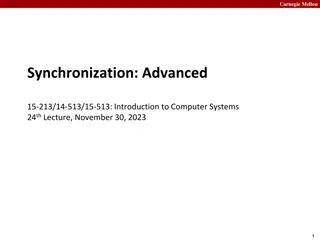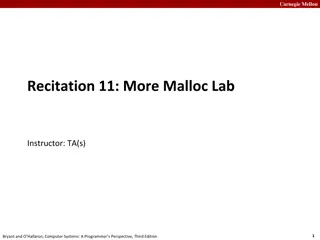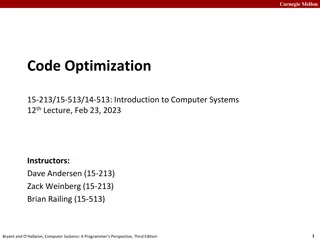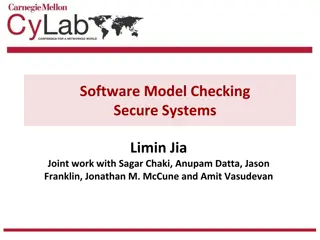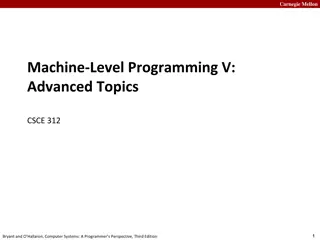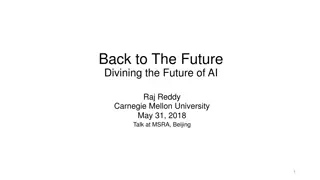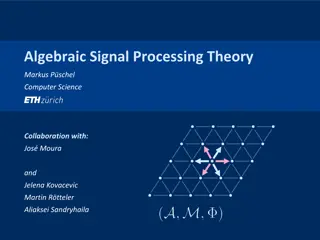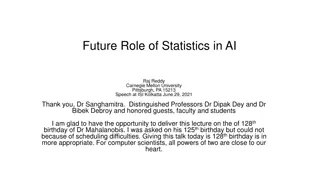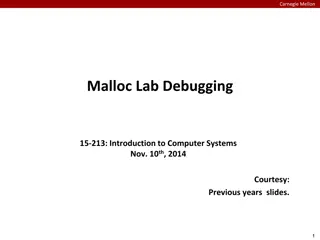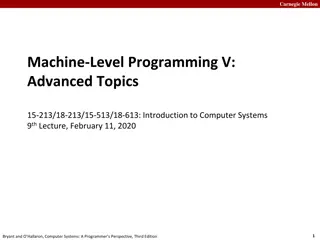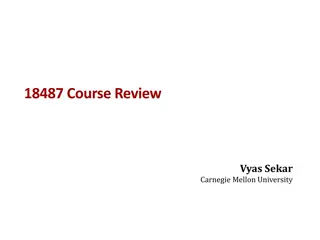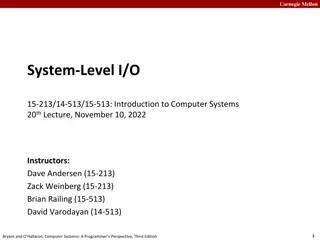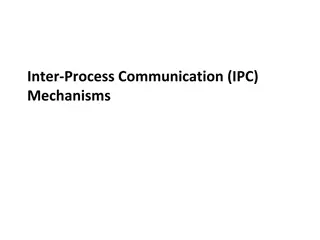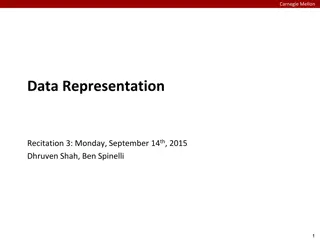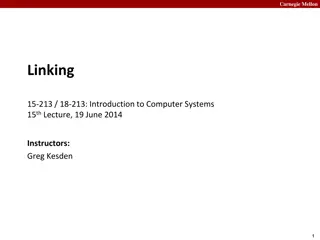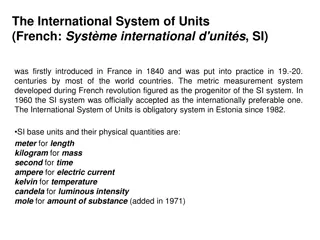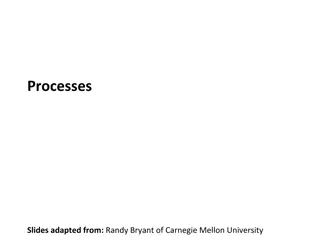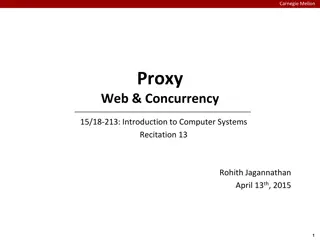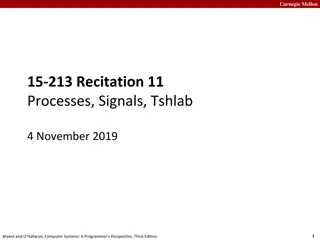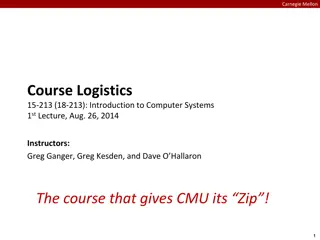Multiplying recruiting units
This presentation delves into the key relationships between church growth and the number, age, and mission of church units, emphasizing the correlation between membership strength and the number of units. It also discusses the importance of starting new churches for denominational growth, Sunday sch
2 views • 28 slides
Carnegie Mellon Synchronization and Computer Systems Lecture Updates
Carnegie Mellon's recent announcements include lab checkpoints and finals deadlines, as well as the release of an optional lab extension for the Shark File System. The lecture topics cover races, mutual exclusion, deadlock, semaphores, events, queues, reader-writer locks, starvation, and thread-safe
0 views • 43 slides
Understanding Memory Management Concepts at Carnegie Mellon University
Explore advanced topics in memory management as taught at Carnegie Mellon University, including dynamic memory allocation, heap structure visualization, and common programming challenges related to memory utilization and throughput. The content covers practical insights and solutions for optimizing
0 views • 21 slides
Understanding Units and Measurements in Physics
Physics is the study of nature and its phenomena, involving various physical quantities like mass, length, time, area, and volume. These quantities can be fundamental or derived, with units selected as standards for measurement. The System International (SI) units offer advantages like coherence, ra
0 views • 14 slides
Understanding Buffer Overflow Attacks at Carnegie Mellon
Learn about the Carnegie Mellon 15-213 Recitation Attack Lab, where you can hijack programs using buffer overflow attacks. Gain insights into stack discipline, stack frames, and defeating secure programs through return-oriented programming. Dive into topics like stack smashing attacks, buffer overfl
8 views • 24 slides
Evolution of Compiler Optimization Techniques at Carnegie Mellon
Explore the rich history of compiler optimization techniques at Carnegie Mellon University, from the early days of machine code programming to the development of high-level languages like FORTRAN. Learn about key figures such as Grace Hopper, John Backus, and Fran Allen who revolutionized the field
0 views • 49 slides
Is Carnegie Hill a Nice Place to Live
Discover why Carnegie Hill is a top choice for NYC living. Explore the charm, safety, and amenities of this neighborhood.\n
1 views • 5 slides
Who Owns The Land Under Carnegie House?
Discover the true owner of the land under Carnegie House and how it impacts the building's future.
1 views • 6 slides
Carnegie Mellon Secure Systems Verification Research
Carnegie Mellon University's research focuses on secure hypervisor systems, address space separation, and verification tasks to ensure security properties in the presence of adversaries. Challenges include scalability in model checking due to complex data structures in address translation. The aim i
3 views • 20 slides
Carnegie Mellon Computer Systems Overview
The content provides an overview of computer systems and network programming at Carnegie Mellon University. It covers topics such as client-server interactions, I/O handling, socket programming, and robust I/O practices. The lectures discuss concepts like TCP/IP communication, C Standard I/O, Unix I
0 views • 67 slides
Understanding Memory Layout in Computer Systems at Carnegie Mellon
Explore the memory layout in computer systems through the lens of Carnegie Mellon University's advanced topics in machine-level programming. Learn about buffer overflow vulnerability protection, memory allocation examples, x86-64 Linux memory layout, and addressing schemes. Dive into practical examp
2 views • 47 slides
Evolution of AI: Insights from Raj Reddy's Talk at Carnegie Mellon University
Delve into the future of AI through Raj Reddy's talk at Carnegie Mellon University, unraveling misconceptions, the essence of AI, historical context, and its progression into the 21st century. Explore themes such as human-AI symbiosis, problem-solving approaches, and the utilization of data-driven k
0 views • 34 slides
Carnegie Mellon Algebraic Signal Processing Theory Overview
Carnegie Mellon University is at the forefront of Algebraic Signal Processing Theory, focusing on linear signal processing in the discrete domain. Their research covers concepts such as z-transform, C-transform, Fourier transform, and various signal models and filters. The key concept lies in the al
2 views • 40 slides
Introduction to Masonry Units in Construction
Masonry units, such as stone, blocks, or bricks, combined with mortar, are essential in construction, with examples seen in the pyramids of Egypt and the Great Wall of China. Structured and non-structured masonry types serve different purposes, with concrete masonry units being widely used. Solid co
1 views • 33 slides
The Future Role of Statistics in AI: Insights from Raj Reddy's Speech at Carnegie Mellon University
Raj Reddy's speech at Carnegie Mellon University delves into the evolving role of statistics in the field of AI, highlighting the shift towards statistical learning and the need for new methods to enable low-cost incremental learning and reinforcement learning. The talk explores the history of AI re
0 views • 15 slides
Debugging Tips for Carnegie Mellon's Malloc Lab
Explore essential debugging strategies for the Carnegie Mellon Malloc Lab, focusing on identifying errors, resolving segfaults, and implementing a heap checker to maintain well-formed heaps. Learn how to efficiently troubleshoot issues and improve your debugging skills in computer systems.
0 views • 19 slides
Proposed Stock Complex Amendments for Caribbean Reef Fishery Management Units
Amendments proposed for the reef fishery management units in Puerto Rico and the U.S. Virgin Islands include changes to stock complexes for parrotfish, grouper, and snapper units. The proposal suggests separating parrotfish units, modifying grouper units, and adjusting snapper units. Additionally, t
4 views • 72 slides
Carnegie Mellon x64 Assembly: Bomb Lab Overview and Execution
Delve into the intricacies of the Carnegie Mellon Bomb Lab, a unique challenge designed by Dr. Evil. Explore phases, detonations, and how to examine and execute your bomb. Unravel x64 assembly registers, operands, arithmetic operations, and comparisons to outsmart Dr. Evil and progress through the l
0 views • 21 slides
Innovations in Performance Computing at Carnegie Mellon
Carnegie Mellon University is at the forefront of performance computing innovations, focusing on portable tracking of evolving surfaces, parallel and heterogeneous computing, software evolution, and compiler optimizations. They delve into the slow pace of change in programming languages, popular lib
0 views • 26 slides
Carnegie Mellon Bomb Lab Overview and Examination
Explore the Carnegie Mellon Bomb Lab, a unique challenge designed by Dr. Evil involving phases, explosions, and careful examination. Delve into x64 Assembly, arithmetic operations, and comparisons to outsmart Dr. Evil. Download your bomb and navigate through the challenges to move forward. Learn abo
0 views • 21 slides
Carnegie Mellon Multithreaded Synchronization Recitation
Explore Carnegie Mellon's recitation on multithreaded synchronization, debugging tools, shared memory synchronization, critical sections, and locking. Dive into the Echo Server Sequential Handling code examples, finding weaknesses using telnet, and advanced debugging techniques with curl and binary
0 views • 34 slides
Understanding Memory Layout and Allocation in Computer Systems at Carnegie Mellon University
Exploring the memory layout and allocation in computer systems through lectures at Carnegie Mellon University, focusing on topics such as buffer overflow vulnerability protection, unions, shared libraries, stack, heap, data locations, addresses, and practical memory allocation examples. The content
1 views • 55 slides
Comprehensive Course Review: Security Research Cornerstones at Carnegie Mellon University
Dive into the essential topics of software security, network security, OS security, and cryptography in the course offered by Vyas Sekar at Carnegie Mellon University. Explore control flow hijacks, cryptography terminology, and the importance of network security in protecting data transmissions. Lea
0 views • 41 slides
Exploring Carnegie Mellon's Introduction to Computer Systems
Delve into the world of computer systems with Carnegie Mellon University's System-Level I/O course, covering concepts such as file operations, Unix I/O, and kernel data structures. Learn about standard I/O, handling I/O devices as files, and understanding the sequence of bytes in a file. Discover th
0 views • 53 slides
Top 5 Luxury Carnegie Hill Condos for Sale Right Now
Explore the top 5 luxury condos for sale in Carnegie Hill. Discover prime real estate options in this prestigious NYC neighborhood.
1 views • 5 slides
Exploring Robber Barons and Monopolies in Industrial Supremacy
Robber barons in the late 1800s believed monopolies were morally justified due to social Darwinism, philanthropy, and their perceived right to control markets through hard work. Examples include Carnegie's steel, Rockefeller's oil, Morgan's banking, and Ford's automotive monopolies. Maintaining cons
0 views • 11 slides
Carnegie Mellon Inter-Process Communication Mechanisms
Carnegie Mellon Inter-Process Communication (IPC) mechanisms enable communication between processes living in different memory address spaces. This involves cooperating processes needing data transfer, resource sharing, event notification, and process control. IPC methods include Pipes, Shared Memor
0 views • 78 slides
Carnegie Mellon Data Representation Recitation Details
Carnegie Mellon's data representation recitation provides a platform for interaction, addressing topics like integers, biasing, endianness, floating point, binary fractions, and the IEEE standard. The agenda includes steps on how to approach the data lab, emphasizing the importance of working on des
0 views • 26 slides
Understanding Linkers in Computer Systems at Carnegie Mellon
The content discusses the importance of linkers in computer systems through a case study and examples from Carnegie Mellon University's Introduction to Computer Systems lecture. It covers the process of static linking, reasons behind using linkers, and the steps involved in linker operations such as
0 views • 53 slides
Industrial Titans: Carnegie, Rockefeller, and Morgan
Explore the lives and legacies of business tycoons Andrew Carnegie, John D. Rockefeller, and J.P. Morgan during the U.S. industrialization era. Understand their influence on industries such as oil, steel, and finance, and analyze their impact on laborers and corporate structures. Dive into the debat
0 views • 16 slides
Evolution of the International System of Units (SI) and Its Base Units
The International System of Units (SI) was introduced in France in 1840 and became globally accepted by the mid-20th century. SI is mandatory in Estonia since 1982, with base units including meter, kilogram, second, ampere, kelvin, candela, and mole. Each base unit is defined by specific physical co
0 views • 22 slides
Understanding Processes in Computer Science at Carnegie Mellon University
Processes in computer science at Carnegie Mellon University are explored, defining a process as an instance of a running program. The illusions of logical control flow and private virtual address spaces are maintained for each program. Components of a process include address space, processor state,
0 views • 50 slides
Understanding x86-64 Stack and Register Usage at Carnegie Mellon
Explore the concepts of stack management, function invocation, and register usage in x86-64 architecture as taught in Carnegie Mellon's 15-213 recitation on Attack Lab. Learn about stack operations, caller vs. callee functions, and the conventions for using registers effectively. Gain insights into
0 views • 26 slides
Understanding Carnegie Mellon's Protection and Security Concepts
Carnegie Mellon University emphasizes the importance of protection and security in operating systems. Protection involves preventing unauthorized access by users, while security focuses on external threats and authenticating system users. The goals of protection include preventing access violations
0 views • 37 slides
Understanding Web Basics at Carnegie Mellon University
Carnegie Mellon University's recitation covers various aspects of web systems including telnet/cURL demonstrations, the inner workings of the web, networking basics, and string manipulation in C. The session explores client-server interactions, manual HTTP requests, and the use of cURL for building
1 views • 36 slides
Understanding Units of Measurement in Physics
Explore the world of physics through the lens of units of measurement, including the Metric System and MKS/SI base units. Learn about the standard kilogram, meter, and second, as well as derived units and the process of converting units in the Metric System.
0 views • 22 slides
Carnegie Mellon Computer Systems: Processes, Signals, and Shell Lab Overview
In this overview of Carnegie Mellon's Computer Systems course, key topics such as process lifecycle, error handling, signal handling, and shell lab assignments are discussed. The importance of understanding process creation, duplication, program replacement, and termination is highlighted. Students
0 views • 37 slides
Carnegie Mellon Course Logistics: Introduction to Computer Systems
Carnegie Mellon University offers the course 15-213: Introduction to Computer Systems, taught by instructors Greg Ganger, Greg Kesden, and Dave O. Hallaron. The course covers essential topics in computer systems and programming, emphasizing practical skills through lectures, labs, and exams. Recomme
0 views • 23 slides
Township of Union Public Schools Report on Impact Employee Recognition and High School Honors Performance Series
Initiatives and achievements within the Township of Union Public Schools include the Impact Teacher Program recognizing dedicated staff and the upcoming 2024 High School Honors Performance Series at Carnegie Hall. The program aims to honor educators and administrators who impact student lives signif
0 views • 16 slides
Higher-Level Synchronization with Semaphores at Carnegie Mellon
Discover how Carnegie Mellon University explores higher-level synchronization primitives such as semaphores for effective thread management. Learn about the design and operations of semaphores, and compare them with traditional locking mechanisms. Dive into code examples and visual illustrations to
0 views • 40 slides

